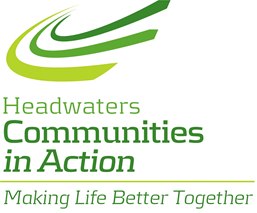Environmental Health is Directly Tied to Your Health

THE ZERO WASTE LIFESTYLE
Welcome to the first in a series of articles focussed on your well-being through environmental stewardship, protection and rehabilitation. On August 24, 2019, the Mill Street location of the Orangeville Public library will be hosting speaker Nancy Lotecki-Neely at 10:30 am. She will be presenting a workshop on how to go “zero waste”.
“Zero waste” is an initiative whereby people learn to live more sustainably by eliminating (preferably) or reducing the waste they produce and haul to the curbside garbage collection every week. Most of us don’t think about the waste we produce. We buy what we want, rip it out of the packaging and throw that packaging “away”. The problem is that there really is no such thing as “away”. Everything goes somewhere and, as a recent CBC news broadcast showed us, our garbage inevitably comes back to haunt us. For example, did you know that only 11% of Canadian plastic waste is actually recycled? Waste companies used to ship it to China who found it to be so contaminated with food and other waste that it couldn’t be recycled. The Chinese have since refused to take our plastics. Malaysia was next to receive it, but they couldn’t do anything with it either and it cost us millions of tax dollars when we had to take it back.
Reducing and eliminating waste and building proper domestic recycling infrastructure is going to be critical to a healthy future for Canadians. We all have to do our part to make this happen, but with such a big issue in front of us, what can we do as individuals?
A whole heck of a lot actually! I’m fond of saying: “Every time you buy, you vote!” for a reason. Business responds to consumer trends so choose carefully what you buy and send a message to businesses as you live your everyday life. Choose products in packaging that are compostable or truly recyclable. Compostable packaging is paper that will leak or dissolve when something wet soaks it (not milk cartons, ice cream tubs or “recyclable” fresh meat envelopes which have a thin plastic layer adhered to the paper). Cardboard is also compostable, but remove any plastic tape/labels on it. Truly recyclable packaging includes clean cardboard/paper, glass and metal. Be wary of plastic (even reusable and recyclable plastic) until the plastics recycling problem we currently have is solved.
Start small and keep your efforts manageable, replacing one or two household items at first to ease into the zero waste lifestyle. As you gain confidence and see the difference you’re already making, you might just be inspired to reduce your waste production even more!
Some suggestions to get you started:
- Avoid yogourt tub and cup waste! Making your own yogourt is EASY. There are a million websites to tell you how and you can order heirloom yogourt culture online. Flavour or sweeten it however you like and use small mason jars to bring it in your lunch.
- Shop at bulk food stores. Bring your own containers (washable cloth bags, clean pickle jars or mason jars all work wonderfully well!). Weigh your jars on your way into the store, fill them, and the cashier will deduct the weight of the jar from your purchase so you pay only for your goods. Not all stores are capable of this but there are local bulk food stores in Dufferin that encourage this, so make sure to ask.
- Use a shampoo bar instead of liquid shampoo in plastic bottles and bar soap rather than liquid soap. There are local businesses that make beautiful products that work well and come in compostable or recyclable packaging rather than plastic.
- Bring your own reusable drink cups everywhere you go. Bring your own containers for takeout or leftovers when you eat out.
- Use stainless steel reusable water bottles rather than water bottled in plastic.
- Buy milk in glass jars that you can rinse out and return to the store. Millers Dairy in Creemore and some of the organic milk brands sell milk this way here in Dufferin. When they deliver another order to the store, they will pick up the jars you have returned, sterilize them and reuse them. Ask your local grocery store if they do (or will) carry these products for you.
- Shop for produce at farmer’s markets or farm stores. You can bring your own bags or containers and avoid packaging altogether this way. Alternatively, buy your produce (e.g. apples, lemons) from the piled displays in the grocery store, rather than getting the ones in bags or plastic nets.
There are a million other ways to reduce or eliminate the waste we produce. A browser search on “zero waste” will give you lots more great ideas. Let your creativity guide you and have fun discovering new ways to avoid waste!
To Learn More: To learn more about Climate Change Action Dufferin-Caledon, please visit our Facebook page and click “like” to follow us!
 Headwaters Communities in Action
Headwaters Communities in Action







